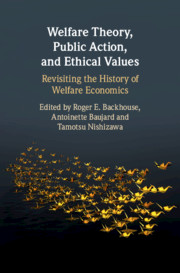Book contents
- Welfare Theory, Public Action, and Ethical Values
- Welfare Theory, Public Action, and Ethical Values
- Copyright page
- Contents
- Figures and Tables
- Contributors
- Acknowledgements
- Introduction: Revisiting the History of Welfare Economics
- Part I Plurality of Welfare in the Making of Welfare Economics
- 1 Ruskin’s Romantic Triangle
- 2 Radicalism versus Ruskin
- 3 Alfred Marshall on Progress and Human Wellbeing
- 4 Pigou’s Welfare Economics Revisited
- 5 To Which Kind of Welfare Did Léon Walras Refer?
- 6 Value Judgement within Pareto’s Economic and Sociological Approaches to Welfare
- Part II Developing Modern Welfare Economics
- Index
- References
1 - Ruskin’s Romantic Triangle
Neither Wealth Nor Beauty but Life*
from Part I - Plurality of Welfare in the Making of Welfare Economics
Published online by Cambridge University Press: 04 March 2021
- Welfare Theory, Public Action, and Ethical Values
- Welfare Theory, Public Action, and Ethical Values
- Copyright page
- Contents
- Figures and Tables
- Contributors
- Acknowledgements
- Introduction: Revisiting the History of Welfare Economics
- Part I Plurality of Welfare in the Making of Welfare Economics
- 1 Ruskin’s Romantic Triangle
- 2 Radicalism versus Ruskin
- 3 Alfred Marshall on Progress and Human Wellbeing
- 4 Pigou’s Welfare Economics Revisited
- 5 To Which Kind of Welfare Did Léon Walras Refer?
- 6 Value Judgement within Pareto’s Economic and Sociological Approaches to Welfare
- Part II Developing Modern Welfare Economics
- Index
- References
Summary
Most Ruskin studies deal with his art theory and economic theory separately. This chapter intends to interpret both discourses in a unified way from the viewpoint of romanticism. While his economic theory is famously summarized in a thesis ‘No wealth but life’ the art theory he worked on can be formalized as a thesis ‘No beauty but life’. Thus we have a unified thesis, ‘Neither wealth nor beauty but life’, which may be called ‘Ruskin’s triangle’. I argue that the concept of life is vital for Ruskin’s unified knowledge. It is identified with its three aspects (capability, composition, and labour) and linked with its six symbolic determinants (admiration, hope, and love; air, water, and earth).
- Type
- Chapter
- Information
- Welfare Theory, Public Action, and Ethical ValuesRevisiting the History of Welfare Economics, pp. 21 - 57Publisher: Cambridge University PressPrint publication year: 2021

